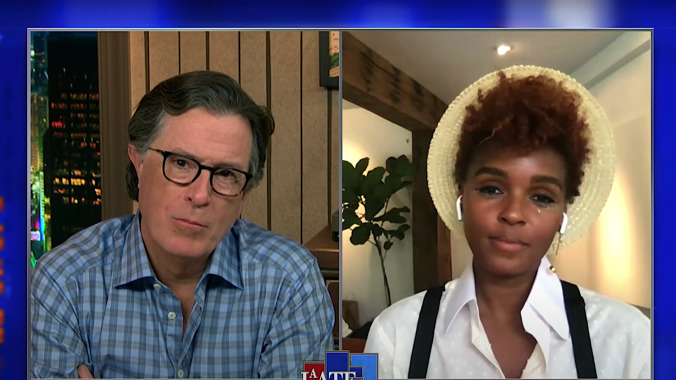Janelle Monáe tells Stephen Colbert about friend Chadwick Boseman, finding revolution in a song
Aux Features Clips
It might be inconceivable to anyone who’s ever seen her perform, but Janelle Monáe told Stephen Colbert that 2020 and its attendant, grinding horrors have sapped even her seemingly irrepressible energy and drive. “Honestly, I really haven’t been inspired musically,” claimed the Grammy-nominated singer, songwriter, actress, high priestess of multimedia Afrofuturism, and inveterate desk-dancer. Reminiscing with Stephen Colbert on Tuesday’s Late Show about the time (two long years ago now) when she and the host danced on Colbert’s Ed Sullivan Theater desk, the Antebellum star said that it took fellow kickass Black woman and rightful governor of Monáe’s home state of Georgia Stacey Abrams to finally get her back into a recording studio.
Monáe, whose standalone song “Turntables” was written specifically for voting rights activist Abrams’ documentary All In: The Fight For Democracy, says that she was there on Election Night when current governor (and then Secretary of State, thus overseer of his own election) Brian Kemp stole the governorship through—wait for it—widespread suppression of Black voting. “I told her, ‘Whenever you need me, call me,’” said Monáe of that crushing night of anti-democratic white supremacy in action, a promise Abrams called in when it was time to score Lisa Cortés and Liz Gabrus nonfiction portrait of how Abrams turned her 2018 Georgia screwjob into a nationwide voting rights movement. Said Monáe of her characteristically funky and forward-thinking musical contribution, “If I can’t pull it together for me, I’m gonna pull it together for her” thus injecting some much-needed energy into the beleaguered existences of those feeling likewise downtrodden by, well, everything.
Tying all the parts of her multifaceted career together, Monáe told Colbert about how her latest, high-concept thriller Antebellum (where her successful Black author and mother finds herself in a Jordan Peele Twilight Zone-style socially relevant mind-fuck of a predicament) also draws its energy from linking the past, present, and future. Calling the wrenchingly relevant film a celebration and examination of the role Black women have always playing in “dismantling systemic oppression,” Monáe told Colbert that the film’s (spoilers redacted) premise is about the burden Black women face every day in that struggle, and how they “emerge triumphant.”
Equally triumphant—if deeply melancholy—was Monáe’s shared memories with Colbert about the late Chadwick Boseman. Remembering the time that the Black Panther cast accepted her invitation to stop by the Dirty Computer Georgia recording studio one night, Monáe glowed with the memory of Boseman dancing, drinking, and playing the drums in what turned into an all-night listening party, calling Boseman’s encouragement and positivity about her work “so present.” (Monáe noted that she, too, is looking forward to seeing how director Ryan Coogler continues Boseman’s on- and offscreen legacy of inspiration and dignity with the now Boseman-bereft Black Panther sequel.) Once more making everything she touches seem part of the same, revolutionary but hopeful grand Afrofuturist plan, Monáe said of Boseman’s groundbreaking role as the super-genius, superheroic leader of technologically wondrous Wakanda, it’s about “seeing ourselves in the future, thriving, being able to tell our stories from our own words and mouths.”
She also told Colbert touchingly about the “one last dance” she shared with Boseman earlier this year, where the Get On Up star tapped her on the shoulder at an Oscar party and said, “Let’s have this dance.” The duo tried to “out-James Brown each other,” according to Monáe, a sight, like so many things in the wake of Boseman’s shocking August death from cancer, we’ll never get to see. “I will really miss him,” said Monáe, adding, however, “I feel like his spirit lives on forever through the incredible work he has done.”
Antebellum is available in pandemic-mandated on-demand on Friday.
1 Comment
I think it’s grand we have artists willing to talk in a real way about grief, and how it affected their work, and how they persevere in the face of it. I remember as a kid feeling like that wasn’t a thing people on the T.V. talked about, except in vague ways, or at a distance. Though it’s unfortunate there’s so much to feel grief over in these times.